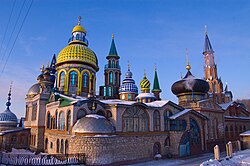Argument from inconsistent revelations
The Argument from inconsistent revelations (also known as Avoiding the wrong hell problem) is an argument that says that God probably does not exist. There are many religions which are based on revelations. The problem with these revelations is that they contradict each other. A person must either accept or reject at least one of these revelations in order to be part of a religious group. That way, accepting one means rejecting some (if not all) of the others. Unless the revelation is personal, the follower must to some extent rely on the judgment or the stories of others. Assuming the revelation is personal, the follower is still ignoring the revelations of those before him.
Christians believe that Jesus is the savior of the world and the son of God; Jews believe just as strongly that he is not. Similarly, Muslims believe that the Qur'an was divinely authored, while Jews and Christians do not. There are many examples of such contrasting views. Positions where one religion contradicts another, or where one group of people contradicts another are common. There are many denominations in Christianity who do not agree about many things.
Argument From Inconsistent Revelations Media
The cross of the war memorial (Church of England/Christianity) and a seasonal menorah (Judaism) coexist at the north end of St Giles' in Oxford, England.
Catholic church, Mosque and Serbian Orthodox Church in Bosanska Krupa, Bosnia and Herzegovina
Batak Christian Protestant Church is located next to the Al Istikharah Mosque in Jakarta, Indonesia.
In Sweden, religions coexist: Katarina Church and the minaret of the Stockholm Mosque
Skyline of Bethlehem with the Mosque of Omar, the Evangelical Lutheran Christmas Church, Salesian Church of the Sacred Heart of Jesus in Bethlehem, Palestine
Puja Mandala, a temple that symbolizes tolerance of diversity in Indonesia located in Kuta, Bali
Temple of All Religions in Kazan, Russia
Congress of Parliament of the World's Religions, Chicago, 1893
Front page of the 1555 Peace of Augsburg, which recognized two different churches in the Holy Roman Empire









